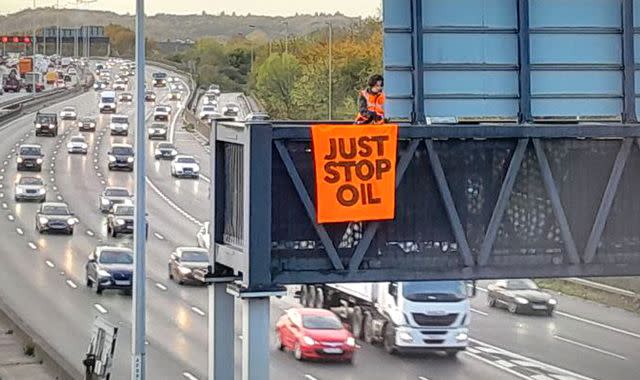Five Just Stop Oil activists have just sentenced to jail terms of up to two years for causing a temporary traffic jam on the M25 motorway, Sky News reported.
The sentences, ranging from two years to 20 months, followed record convictions for peaceful protesters after a jury found them guilty of planning direct action that caused thousands of hours of delays for drivers and hundreds of thousands of pounds in losses to the economy and police.
George Simonson and Theresa Higginson received two-year sentences, Paul Bell got a 22-month sentence and Gaie Delap and Paul Sousek faced 20-month sentences. The sixth defendant, Daniel Johnson, was sentenced to 21 months’ imprisonment suspended for two years and 200 hours of community service. According to The Guardian, Soucek and Delap made statements prior to sentencing.
Nevertheless, all have pleaded guilty to disorderly behaviour during four days of disorderly behaviour on the M25 motorway as Just Stop Oil supporters climbed several bridges over the M25 motorway that girdles London. For many of the 181,000 motorists the Highways Agency estimates were delayed by the co-ordinated four-day nuisance campaign, this may seem like justice being served. But the international community has condemned tougher penalties for non-violent protests.
Today marks a very dark day for fundamental human rights in the UK, according to Michel Forst, the United Nations Special Rapporteur on Environmental Defenders, who attended their trial at Southwark Crown Court.
Raj Chada, a lawyer from the law firm Hodge Jones & Allen who represented one of the activists, said: “There can be no justification for the level of sentences that are being imposed. These are sentences which have traditionally been reserved for violent offences. And in the UK, we’ve always said that no matter what the protest, even if it is disruptive, you get credit for it being non-violent.”
Lord Walney, who conducted a review of political violence and extremism for the Home Office in 2021, underlined: “These prison sentences, although they are somewhat of a surprise, and they are long, send the message that there are consequences for the behaviour of extreme activists.”
The statement came amid riots sparked by the Just Stop Oil movement, which continued this week with paint spraying and sit-ins at airports, that harsh penalties should be introduced for non-violent disorder.
The Home Office in response to the review or replacement of decisions said: ‘We recognise the democratic right that people must be free to peacefully express their views, but they should do so within the bounds of the law. Protest organisers should engage fully with the police.”
Lawyers representing some of the Just Stop Oil activists convicted in both recent trials have already confirmed that they will be appealing the sentences. This follows the Court of Appeal’s previous upholding of the judges’ decisions in the challenge cases, meaning that the UK’s recent practice of penalising environmental activists is likely to be referred to the European Court of Human Rights.
The last government, amid pressure to tackle co-ordinated environmental campaigns, introduced a series of measures that increase the maximum sentences available to judges in protest cases.
